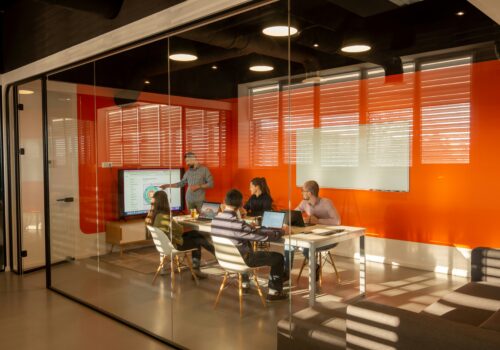Interview with Josh Knight, Business Consultant
Let’s start with a fun question: Tell me two interesting things about yourself.
My partner and I co-lead our local Ainsley’s Angels chapter. It’s a volunteer organization that encourages participation with differently abled folks — people, men, women and children — primarily by pairing a differently-abled athlete with an abled athlete who pushes them in local races.
I originally got started with the organization when I was asked to help push a large athlete in a particular running race that was very hilly. And they said, “Well, you’re a big guy. He’s a big guy. We need somebody to help push him.” [Laughs]
Now I’ve pushed athletes in ten half marathons, and we have people in the Angels who have pushed athletes in triathlons, marathons and even 100k races.
The other interesting thing about me is that I am a former paratrooper in the Army. I worked four years with the 82nd Airborne at Fort Bragg, and then four years in Special Operations at Fort Campbell.
Wow, that’s amazing! How many jumps did you do?
I did about 85 jumps. It’s actually not that hard. All you have to do is leave the plane and you will hit the ground, guaranteed.
I thought becoming a paratrooper would help me get over my fear of heights, but it didn’t. [Laughs] It was completely unsuccessful. It’s funny, we used to say, “It’s not really the fall that’s scary. It’s the sudden stop at the bottom.”
Yes, I guess that’s true! Now, let’s talk about your role at Syte. What’s your title here, and what kinds of projects do you work on?
I’m a business consultant. Right now, I’m primarily working in a business analyst role, supporting one particular company. They had an ERP go live about six months ago and are facing some challenges. I happen to be particularly skilled with the ERP system they’ve just implemented,
I’m also pretty strong in communication roles. My goal is to work towards becoming a Business Solution Architect.
Can you tell us more about your educational and work background?
I’m currently pursuing a master’s degree in industrial organizational psychology. I also have a bachelor’s in business administration.
My career began in the army, where I started in logistics, kind of by accident. I didn’t know much about logistics at the time, but I took the opportunity and it turns out I liked it and had a good understanding of it.
For the last 20 years, after leaving the service, I’ve alternated between working as an ERP implementation consultant and working in the supply chain and physical logistics world. From a business perspective, I’ve managed warehouses, inventory and transportation, and even worked as an engineer for a while. My experience revolves around the logistics realm across a wide range of industries.
It’s a good fit for here at Syte, because my background gives me a good sense of what our clients need, from an ERP perspective.
It sounds like you bring a wealth of experience to the team. Speaking of which, what is your favorite part about working at Syte so far?
The best part is the people. It’s really difficult right now to begin working for a fully remote company, particularly when I don’t have any on-site time.
So just being introduced to everyone virtually is a challenge. The Syte team consistently reaches out to say, “Good morning. How are you? How’s your day going?”
These things are very important, and they’re difficult to find in remote workplaces.
That’s great to hear about Syte’s team culture. Now, let’s switch gears a bit. What trends are you noticing in the manufacturing industry that CFOs and CEOs should pay attention to?
The first one is that there’s been a strong push for automation, but it’s slowing down slightly. The personnel you need to run that automation can be difficult to find and expensive to hire. We’re relying a bit more on human brainpower and human beings now.
Another trend is that the pandemic has also dramatically impacted supply chains. Previously, shipping from Asia typically took 40-45 days. During the pandemic, it increased to six months. Currently, it’s around 45-80 days.
Many of Syte’s clients aren’t big enough to have their own containers, and having to share slows things down even further because it takes longer to fill them up. That exacerbates the wait time problem.
Manufacturing is now starting to return to the United States. This is primarily due to quality concerns with third-party manufacturers, as well as socioeconomic and humanitarian concerns in some parts of the world. This is a positive trend, but we need to be cautious about raising wages without pricing finished goods out of reach for the consumers they’re intended for.
Those are some significant trends. Connecting this back to the work that you do with Syte, does the right ERP solution help with any of these challenges?
Yes, particularly from a visibility perspective. Every ERP has commonalities, but they also have slight differences that often trend toward particular facets of the business. I’ve worked with ERPs at three levels: the SAP level (top tier), the mid-level with Infor, and now NetSuite for small to medium businesses.
For Syte’s mid- and emerging enterprise-sized clientele, you wouldn’t necessarily want the trade-off of having an SAP system. While SAP is amazing, the subscription costs alone would crush a smaller company — and the administration and setup are so costly that it often doesn’t make sense for smaller businesses.
There’s a trade-off between what the system can do and what a person can do. For example, the supply chain module in NetSuite provides background data and suggestions, and then companies rely on people to understand trends and make the best decisions based on these recommendations. This is opposed to a system like SAP, which runs more autonomously.
Overall, picking the right ERP solution is critical for manufacturing and distribution companies in today’s economy.
What is one thing Syte clients would say about you?
They’d say I always provide transparency and honesty. Sometimes there are situations where I don’t have an answer to their question — at least not immediately — and I say that outright. I think clients find that refreshing. I will have an answer for them, but it may not be right away, and I’m upfront about that.
Our clients would also say I care and always give my best effort. It’s very difficult for me not to care.
Let’s end this interview with a bit of fun. Tell me something funny about yourself, or a humorous experience you have had.
Several years ago, I was looking at pictures of my niece’s birthday party with my brother, her dad. One of the pictures showed a balding man leaning over to pick up my niece, and I couldn’t identify him from the top of his bald head. I asked my brother who the man was. He told me, “That’s you!”
I shaved my head that night — and have ever since.
ERP Readiness Self-Assessment
Is your organization ready for a new or upgraded ERP solution? Find out with this complimentary self-assessment.
Doing Business Better
You strive for excellence, believe in your people, and want to do things right the first time. And you know that you need help to get to the heart of your business challenges and make the best choices for the future of your privately held manufacturing and distribution company. That’s where we come in.
We help you focus and find exactly the right path to accelerated growth and sustainable success — from your people to your processes to your ERP software.


